Here at Southern Vision Alliance, we’re expanding our support—and our resources—for frontline organizing across North Carolina and the broader South. This summer, we launched our new Solidarity Grant program, focused on Black-led groups. In the tradition of mutual aid, the program provides mini-grants to groups to help them scale up their efforts. We also provide one-to-one technical support—in the service of building long-term relationships. As Wesley Morris, SVA’s Director of Frontline Funds, Programs, and Strategy, put it, “We are building trusting relationships, based on solidarity, that will last beyond support for an event or urgent response. The idea is to use SVA’s organizational capacity to help build a network that cuts across borders of difference and create space for partnerships to happen—likely ones and unlikely ones.” Read more about a few of our Summer 2021 Solidarity Grantees below.
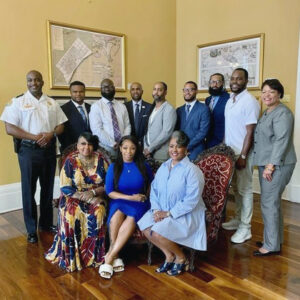
Barbers and Beauticians Collective Fellowship: Addressing gun violence without police New Orleans, LA
Vision: Barbers and beauticians are community leaders and interface with hundreds of people a week. They often know about conflict before anyone else. This seven-week fellowship, hosted by the Mayor’s Office of Gun Violence Prevention, trains barbers in conflict resolution and mediation skills so that they can de-escalate conflicts that might arise. It’s the first known initiative of its kind in the state.
Are there challenges on the horizon that you and your community are working to prepare for? Patrick Young, Director of the Office of Gun Violence Prevention: The fact is that a healthy and safe community costs money. Look at how much money was spent for coronavirus. That was a public health crisis that impacted the entire country and the world. It shut down economic opportunities globally. We had stimulus packages. We had PPE loans. In the same vein, when we look at violence and how it spreads like a virus, we need the money and the resources to attack issues in the community. If you have 6 kids, 14 year olds, who get shot, we have to prioritize health and wellness with our resources.
When you think of “beloved community,” what does this mean for your work? A community that’s cared for. Right now, I feel like it’s an unloved community. It’s neglected, it’s not taken care of, it’s sick. There’s a lot of problems in development and access. Trying to change it to a beloved community involves intentionality in caring for the growth and development of the people who exist in that place.
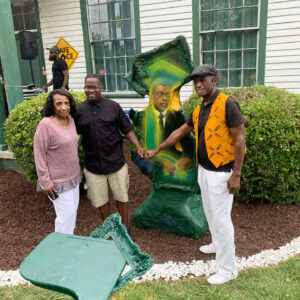
TAB Arts Center Non Profit: Honoring the ancestors
Greensboro, NC
Vision: TAB Arts Center Non Profit is committed to bringing diverse, quality art programs to all ages of the community. Our goal is to encourage intergenerational interaction and engagement through visual and performing arts.
What have you been up to recently? Sunny Gravely Foushee, Executive Director: This summer, we unveiled our “Ancestral Sculpture Garden” at East White Oak Community Center, one of the oldest historic African American buildings in Greensboro. They are on the State Historic Registry. We applied and were granted funds to honor the lives of two local residents: David Richmond of the A&T 4 and Truman Gant, a trailblazer and community leader. It was my job to curate, organize, find the artists, and coordinate with staff and the Board of Directors.
How do you plan to carry the spirit of the ancestors forward in your work? Our organization wants to commemorate, honor and magnify historically marginalized and underrepresented communities by highlighting the contributions of our ancestors. Our next project will be in the Kings Forest neighborhood off Phillips Avenue in Greensboro. We plan to work with the community to honor and magnify our ancestors through murals and beautification projects over the next six months. We will continue to strive to bring more awareness to our ancestors’ contributions by creating more work reflecting their triumphs, challenges, and success.
When you think of “beloved community,” what does this mean for you? Beloved community means to me, a place where young people respect their elders and elders respect the youth. I think of it as a place where we encourage and support one another. Uplift and magnify each other and protect and live for one another.
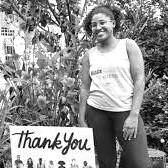
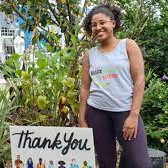
Fresh Future Farm: Building a Black-led food system North Charleston, SC
Vision: We address health, wealth, and quality of life issues through radical work. The Farm offers grocery services, farm training, micro-entrepreneurship support, and online education and agritourism events. The Farm serves Chicora/Cherokee, one of eleven neighborhoods experiencing food apartheid in the city of North Charleston.
When you think of “beloved community,” what does this mean for you? When I hear the term “beloved community,” we think of our team, our dynamic board, supporters, volunteers, donors—everyone who helped build Fresh Future Farm based on a vision of what’s possible. But also I think of the people that live in the Chicora/Cherokee neighborhood and the Black farmers we dream with on a state and national level. We’re creating a path to unapologetic food, land and environmental sovereignty.
Are there challenges on the horizon that you and your community are working to prepare for? We have a month-to-month lease on the land farm by the City of North Charleston. Despita a successful Kickstarter fundraiser in 2019 and backer appeals to the City, our future at this site remains in limbo. Additionally, gentrification is making it nearly impossible to purchase a home or afford rent, so livability is an issue for our team members and our neighbors.
Is there a moment over the past few years that has especially given you hope for the South? We worked with Black farmers across the state to build the SC Black Farmers Coalition. The enthusiasm and wisdom urban and rural farmers bring to table cannot be measured because they’re priceless. It’s also so nurturing to have like-minded people with shared goals get together to rebuild a Black-led food system.
At SVA, we support frontline efforts, big and small, to disrupt and transform power. Are there figures in Southern movement history that exemplify this for you? Lately, we’ve been talking about Fannie Lou Hamer and her work creating the Freedom Farm Cooperative that combined housing and farming. Booker T. Whatley is another figure that inspires our work. His advocacy and strategic plans for small farmers continues to teach us how to make a living with smaller plots of land. Our vision for our future is firmly shaped by these past contributions and present vibrations. Prayerfully, we will live up to and grow their legacy.
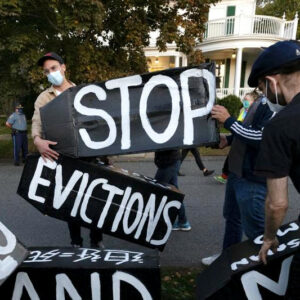
Louisiana Fair Housing Action Center: Protecting renters statewide
New Orleans, LA
Vision: The LaFHAC is a nonprofit civil rights organization established in 1995 to eradicate housing discrimination. LaFHAC’s work throughout Louisiana includes educational offerings, free legal services for victims of housing discrimination, policy advocacy, and foreclosure prevention counseling. LaFHAC is dedicated to fighting discrimination because it is an illegal and divisive force that perpetuates poverty and segregation, and limits access to opportunity.
What have you been up to recently? This summer, we forced big business lobby groups to the table to negotiate with us, and collectively, we were able to pass two bills to protect renters during this legislative session. The first, HB 375 by Rep. Aimee Adatto Freeman, will ensure survivors of sexual assault can end their leases early and without penalty so they don’t have to re-live their assault or feel unsafe in their home. The second, HB 374 by Rep. Royce Duplessis, will allow renters to offer an explanation about a pandemic-related eviction when they apply for housing, and will require landlords to tell tenants about their screening requirements before charging an application fee. These bills never would have made it out of committee without the brave testimonies of LSU students, moms like Arielle Butler, and emails and phone calls from supporters.
Is there a moment over the past few years that has especially given you hope for the South? In January, Black and Brown women organized the way into winning Senate and Presidential victories in GA. And then in July,when Louisiana organizers successfully pushed to sustain Governor Edward’s vetoes and stopped the anti-trans and NRA bills in the Louisiana legislature.
At SVA, we support frontline efforts, big and small, to disrupt and transform power. Are there figures in Southern movement history that exemplify this for you? Oretha Castle Haley, because she was one of the only women to lead a civil rights group chapter.
